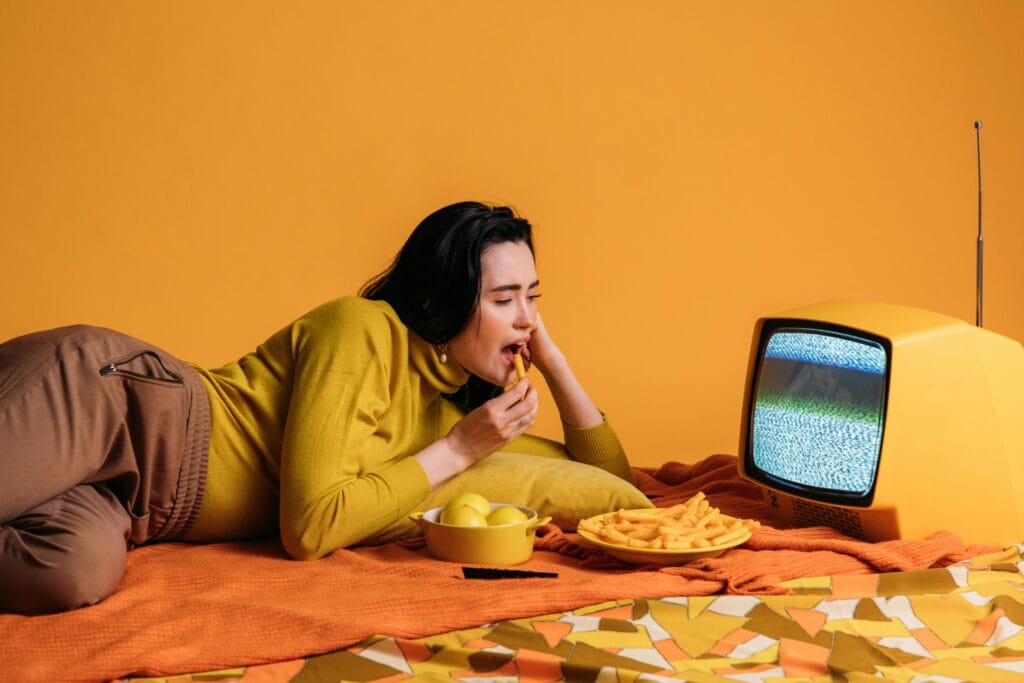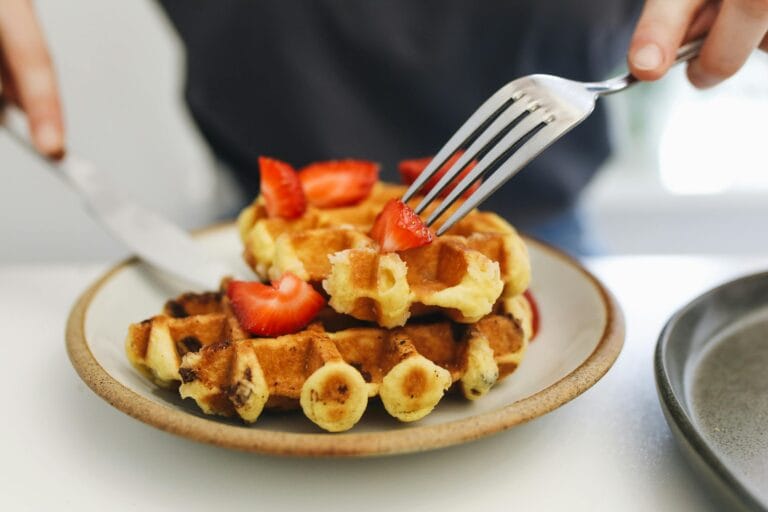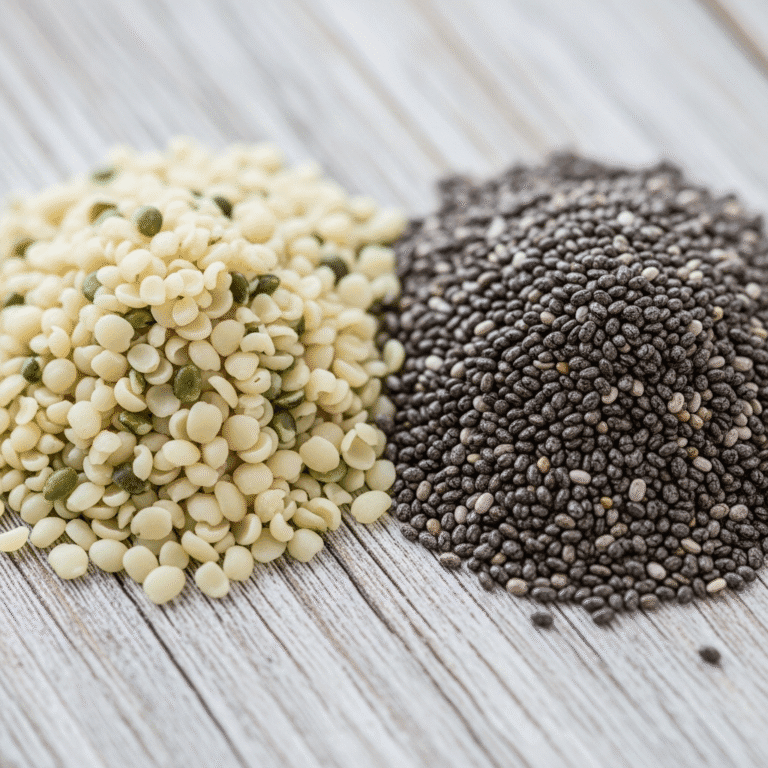FREE SHIPPING OVER $50
7 Foods That Protect Your Eyes From Screen Damage—A Dietitian’s Daily Picks

Our modern lives are permanently tethered to screens. From laptops and smartphones to tablets and TVs, we spend countless hours bathed in blue light. This constant exposure isn’t just a threat to your sleep cycle; it’s a silent, daily assault on your eye health. Over time, this digital environment can accelerate eye strain, increase the risk of dry eyes, and contribute to long-term retinal damage. We often focus on glasses and screen filters, but the most powerful defense against this modern problem starts not in the optics store, but in the kitchen.
As a dietitian, I’ve seen firsthand how effectively targeted nutrition can build a natural internal shield for the eyes. The solution lies in two key antioxidants, which are naturally filtered by the eyes and concentrated in the macula, the part of the retina responsible for sharp, central vision. These compounds work like internal sunglasses, absorbing harmful blue light before it can reach and damage the photoreceptors. By making 7 simple food swaps part of your daily diet, you can significantly reduce the effects of screen damage and maintain optimal vision health for the long haul.
The Science of Screen Damage and Nutrition
To understand how food protects your eyes, you need to know what happens when you stare at a screen all day. Blue light is a high-energy visible light that can penetrate deep into the eye, reaching the retina. Over time, this exposure creates oxidative stress, generating free radicals that harm the delicate cells responsible for vision.
Lutein and Zeaxanthin: The Vision Defenders
These powerful carotenoids are the only antioxidants that the body specifically uses to fortify the macular pigment.
- Internal Filter: Lutein and zeaxanthin physically absorb the high-energy blue light, neutralizing the harmful rays before they can cause oxidative damage.
- Neutralizing Free Radicals: Beyond filtering, they act as powerful scavengers, neutralizing the free radicals generated by eye strain and light exposure, thereby protecting the retina’s sensitive tissues.
The best part? These compounds are easily accessible in everyday foods. Here are the 7 daily picks I rely on to keep my vision health optimized.
7 Foods That Protect Your Eyes From Screen Damage
Food 1: Spinach and Kale (The Lutein Powerhouses)
When it comes to lutein and zeaxanthin, leafy greens are the undisputed champions. They are the cornerstone of any vision-protecting diet.
- The Power: Spinach and kale contain the highest concentrations of these carotenoids found in any food. Kale, in particular, offers a massive dose per serving.
- Dietitian’s Daily Tip: Don’t eat them raw! The lutein in leafy greens is more bioavailable (easier for the body to absorb) when lightly cooked or consumed with a source of healthy fat. I toss a handful of spinach into scrambled eggs or lightly sauté kale with a teaspoon of olive oil.
Food 2: Egg Yolks (The Perfect Package)
While spinach has more raw carotenoids, the bioavailability of lutein and zeaxanthin found in egg yolks is unmatched.
- The Power: The fats and proteins in the yolk help your body absorb the carotenoids efficiently. Eggs are also rich in zinc, a mineral essential for transporting Vitamin A from the liver to the retina.
- Dietitian’s Daily Tip: Aim for one to two eggs daily. If you’re concerned about cholesterol, remember that recent nutrition science shows dietary cholesterol has minimal impact on blood cholesterol for most healthy individuals. Prioritize the yolk for its vision health benefits.
Food 3: Yellow and Orange Peppers (The Hidden Source)
Most people associate lutein with green foods, but the yellow and orange pigments in bell peppers are also excellent sources of zeaxanthin.
- The Power: Yellow peppers, in particular, are packed with zeaxanthin, offering diverse antioxidants that fight cellular damage throughout the body, including the eyes.
- Dietitian’s Daily Tip: Slice up orange or yellow peppers for an easy mid-day snack to munch on while you work at your screen. The Vitamin C content in peppers also supports the blood vessels in the eyes.
Food 4: Oily Fish (Omega-3 DHA)
This selection shifts the focus from antioxidants to structural health and combating common side effects of screens, like dry eyes.
- The Power: Oily fish like salmon, mackerel, and sardines are rich in DHA (Docosahexaenoic Acid), a crucial type of Omega-3 fatty acid. DHA is a major structural component of the retina and helps maintain the health of the oil glands in the eyelids, which are responsible for preventing tear evaporation (and thus, dry eyes).
- Dietitian’s Daily Tip: Aim for at least two servings of oily fish per week. If fish isn’t an option, a high-quality Omega-3 supplement derived from algae or fish oil is a worthy investment in your eye health.
Food 5: Sweet Potatoes and Carrots (Beta-Carotene Power)
You likely heard this one as a child, and the advice still holds up. These vibrant orange vegetables are loaded with beta-carotene.
- The Power: Beta-carotene is a precursor to Vitamin A. Vitamin A is absolutely essential for producing Rhodopsin, the light-absorbing protein required for low-light and night vision. Consuming these regularly helps fight vision health decline and fatigue.
- Dietitian’s Daily Tip: Roast sweet potatoes with their skin on, or incorporate raw carrots into your lunch. Pairing them with a little fat (like olive oil or hummus) dramatically increases the absorption of the fat-soluble Vitamin A.
Food 6: Broccoli (A Well-Rounded Vision Booster)
While not as dominant as kale in lutein, broccoli provides a fantastic combination of essential eye nutrients.
- The Power: Broccoli offers a solid amount of lutein and zeaxanthin, alongside high levels of Vitamin C and sulforaphane. Vitamin C acts as a powerful antioxidant for the lens and retina, fighting free radical damage caused by blue light.
- Dietitian’s Daily Tip: Steam broccoli lightly. Over-boiling drains the water-soluble vitamins and antioxidants. Steam it for just a few minutes until it’s still bright green and slightly crunchy.
Food 7: Citrus Fruits (The Collagen Connector)
This choice focuses on the structural integrity of your eyes, ensuring the blood vessels remain strong and resilient.
- The Power: Citrus fruits (oranges, grapefruits, lemons) are famous for their Vitamin C content. Vitamin C is vital for the formation of collagen, the connective tissue that supports the structure of the cornea and the tiny blood vessels within the eyes. Strong blood vessels are essential for delivering nutrients and oxygen.
- Dietitian’s Daily Tip: Start your day with a lemon wedge in your water, or enjoy a whole orange as a snack. This consistent daily habit provides the structural support your eyes need to withstand the daily onslaught of screen time.
Action Plan: Building Your Anti-Screen Diet
Incorporating all 7 foods into your daily diet is easier than you think. Focus on stacking these nutrients at every meal:
- Breakfast: Eggs (Yolks) + Sautéed Spinach/Kale.
- Lunch: A large salad base of raw Kale or Spinach with some chopped Yellow Peppers.
- Dinner: Baked Salmon (Omega-3s) with a side of lightly steamed Broccoli.
- Snacks: Carrots, Sweet Potato cubes, and Citrus fruits.
Conclusion
The modern digital world places unprecedented demands on our eyes, making targeted nutrition more critical than ever before. These 7 dietitian-approved foods are your best defense against screen damage. By making the intentional choice to consume these daily picks, you empower your body to filter blue light, fight oxidative stress, and ensure your vision health remains sharp and clear for years of screen time ahead.
Related Articles
- Blood Sugar Spikes? Swap These 6 Foods for Smarter, Healthier Meals
- Struggling With Blood Sugar? These 5 Whole Grains Help Reverse Insulin Resistance Naturally
- Over 50? These 10 ‘Healthy’ Breakfast Foods Are Quietly Spiking Your Blood Sugar
- Tired Eyes? These 14 Foods Fight Eye Strain and Protect Your Vision—Backed by a Dietitian
- Feeling Low? These 15 Foods Act Like Natural Antidepressants, Say Psychologists







